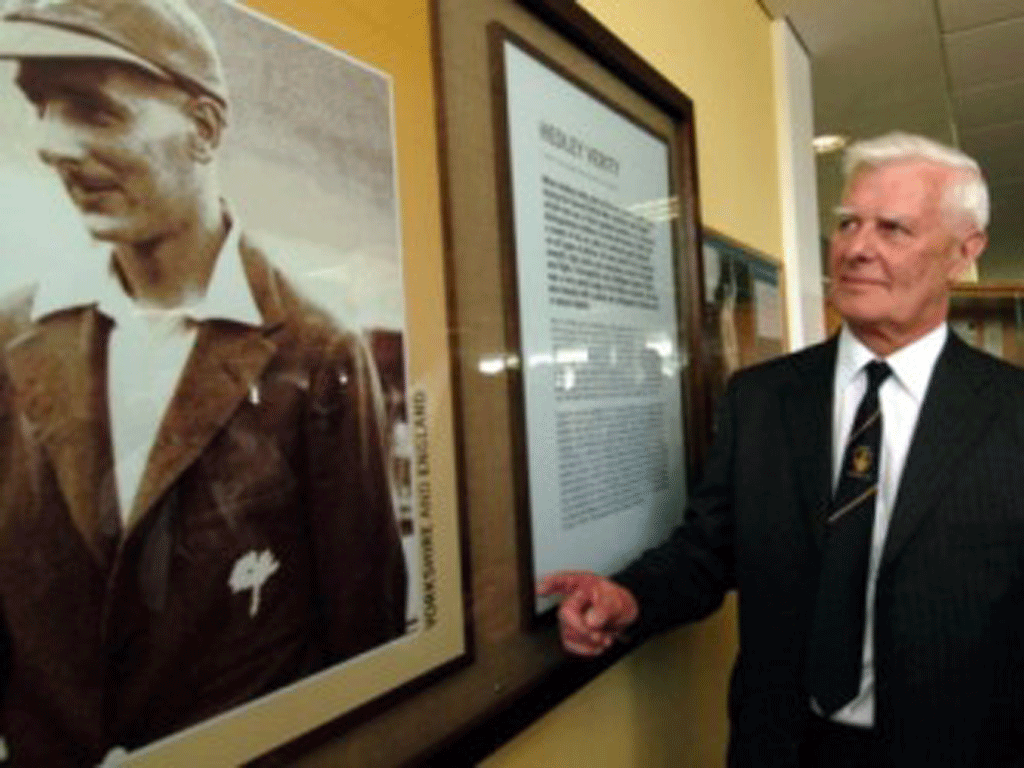George Verity: Golfer, climber and cricketer

Your support helps us to tell the story
This election is still a dead heat, according to most polls. In a fight with such wafer-thin margins, we need reporters on the ground talking to the people Trump and Harris are courting. Your support allows us to keep sending journalists to the story.
The Independent is trusted by 27 million Americans from across the entire political spectrum every month. Unlike many other quality news outlets, we choose not to lock you out of our reporting and analysis with paywalls. But quality journalism must still be paid for.
Help us keep bring these critical stories to light. Your support makes all the difference.
The youngest son of the Yorkshire and England cricketer, Hedley Verity, who was killed in action during the Second World War, Douglas Verity was an accomplished sportsman in his own right. Having inherited his father's love of cricket, he later found fame as a climber before making his mark in the world of golf.
He was born shortly after his father returned home from the Bodyline tour of Australia in 1933. His elder brother Wilfred was named after his father's predecessor in the Yorkshire side, Wilfred Rhodes; George Douglas Verity took his names from fellow left-arm bowler George Hirst and the celebrated England captain Douglas Jardine. At Littlemoor Primary School, Rawdon, fellow classmates included future Yorkshire stars Brian Close and Bryan Stott. Lifelong friends, all three would soon make their mark for the local cricket club.
In only nine seasons in first class cricket from 1931 onwards, Hedley Verity, one of the most skilful slow left-arm bowlers in the history of the game, claimed a remarkable 1,956 wickets for club and country, winning some 40 Test caps. Against Australia at Lord's in June, 1934, he twice dismissed Don Bradman to set up an England win.
In 1939, Verity and his young family considered moving to South Africa, but war put the plans on hold. Joining the Green Howards, he was soon promoted to Captain. Leading his men in an attack on a heavily defended ridge outside Catania, amid the 8th Army's assault on Sicily, he was shot and captured, dying of his wounds in a POW hospital near Naples. He was 38.
Douglas was 10 when he heard the news of his father's death on the radio. He went on to become a groundsman and cricket professional for Yeadon in the Bradford League. A stylish and aggressive left-handed opening batsman and occasional wicket keeper, Verity proved an accomplished and thoughtful cricketer, his infectious enthusiasm inspiring the whole side.
At his best when the pitch was at its worst and the bowling at its most hostile, of his many notable batting displays none was perhaps finer than his contribution to the victory over Farsley in the 1949 Priestley Cup final. Typically resolute against the fearsome pace of the Derbyshire and England quick bowler, Bill Copson, his 49 not out helped complete a notable hat trick of Cup victories. However, a serious knee injury, sustained while having football trials with Leeds United, brought his burgeoning cricket career to a premature end.
He often felt overwhelmed by his heritage, but 1955 brought a fresh start with a move to Snowdonia to manage Pen-y-Gwryd, the climbing hotel. While there he climbed regularly with such luminaries as Joe Brown. He was one of the early volunteers who ran the Snowdon Rescue Service, before the formation of the Snowdon Mountain Rescue Team.
In 1963 he became the professional at St Deiniol Golf Club, Bangor. St David's Day 1970 heralded a move to Pwllheli Golf Club, where over the the next three decades he acquired a formidable reputation, not only as an outstanding teacher but also as a very fine tournament golfer. On retirement in 2000, he was elected club captain.
In 1975 his brother Wilfred, a successful photographer, was killed in a freak accident when a cattle trailer broke free, crushing him to death. Wilfred's seven-year-old son, Hedley, also suffered multiple injuries.
Almost 70 years ago, the obituaries for Hedley Verity invariably adhered to the premise "De mortis nil nisi bonum dicendum est" (Let nothing be said of the dead but what is good). The reason? Because, one would be hard pressed to find anything other than good to say about the man. The same could so easily apply to his son.
George Douglas Verity, sportsman: born Rawdon, West Yorkshire 4 June 1933; married (two sons); died Pwllheli, Gwynedd 24 August 2012.
Subscribe to Independent Premium to bookmark this article
Want to bookmark your favourite articles and stories to read or reference later? Start your Independent Premium subscription today.
Join our commenting forum
Join thought-provoking conversations, follow other Independent readers and see their replies
Comments